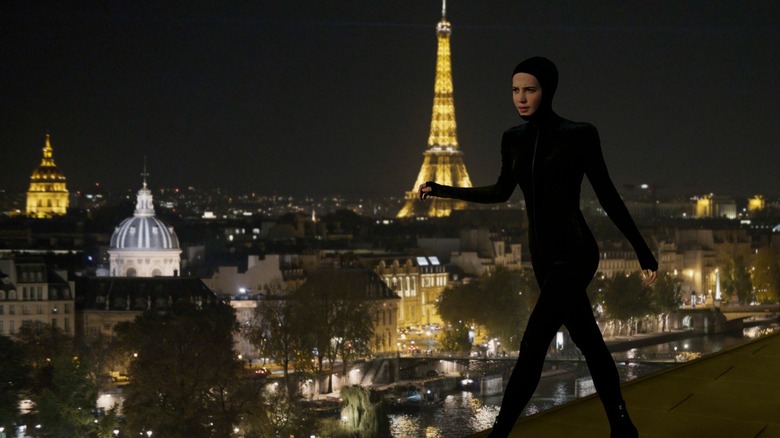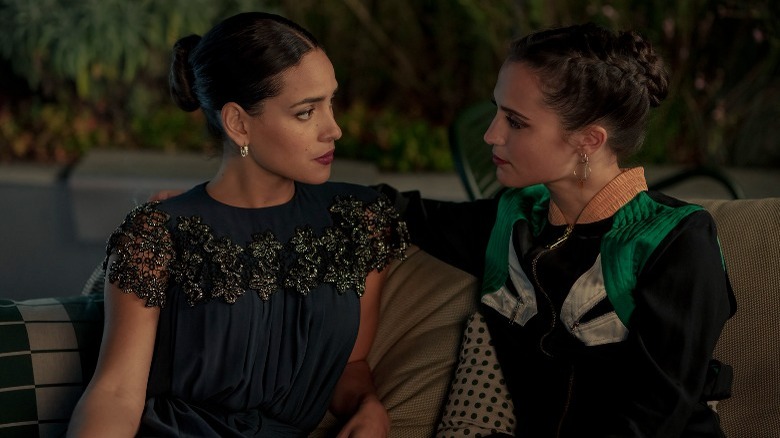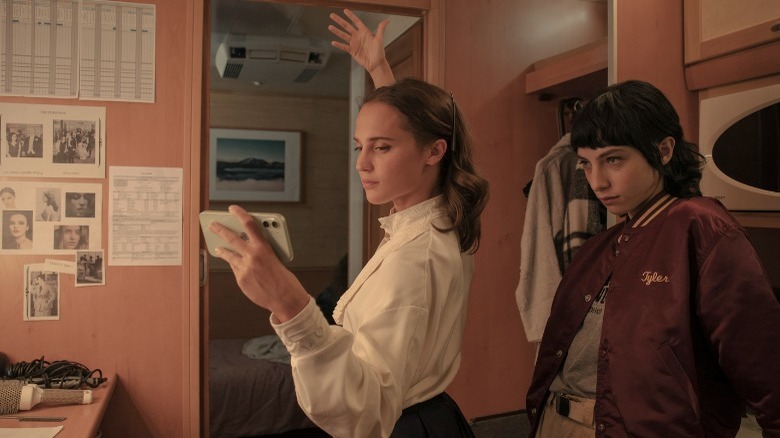Irma Vep Review: Olivier Assayas Turns His Wonderful 1996 Film Into A Muddled Miniseries
Explaining what exactly Olivier Assayas' HBO series "Irma Vep" is is surprisingly complicated. It's been billed as a re-imagining, rather than a remake, of his 1996 film of the same name. Assayas original film followed actress Maggie Cheung, who is cast in a remake of "Les Vampires," an epic silent-era serial directed by Louis Feuillade, about a criminal gang who called themselves the vampires. It's perhaps easiest to describe the HBO series as an updated, expanded version of the '96 film. Both are nearly identical in concept, with Cheung being replaced by Alicia Vikander in this contemporary retelling. There are even a number of characters and actors that exist in both versions, blurring the lines between the two versions even further.
Vikander stars as Mira, a major American actress who has become disillusioned with the Hollywood way of filmmaking. She's hot off of "Doomsday," a major blockbuster, but instead of continuing to make major American cinema, she signs on to make an independent remake of the silent classic "Les Vampires," leaving the hustle and bustle of Hollywood for Paris. The opportunity comes to Mira on the heels of a highly-publicized break-up, and the chance to work with director René Vidal (Vincent Macaigne), whose work Mira admires, and taking on one of cinema's defining roles made famous by Musidora is simply too irresistible to turn down.
Of course, this opportunity of a lifetime isn't all that it seems. The process of making the show is fraught with peril, from a cavalcade of conflicting performers to behind-the-scenes drama that largely stems from Vidal's immense difficulty in pulling things together. The director lives in the shadows of Feuillade's original work and is tormented by his past demons, and the fact that he fears he'll never come close to the glory of Feuillade's film. On top of all the on-set drama, Mira is being hounded by her agent (a delightfully venomous Carrie Brownstein), who wants her to come back to Los Angeles and take the starring role in a female-led "Silver Surfer," of which her salary would likely be more than the entire budget of "Les Vampires." There's also a whole lot of sexual tension, as seemingly everyone wants to be involved with Mira, and she certainly has plenty of desires herself. And, as things get crazier, Mira seems to be slowly but surely becoming more like her character.
A cacophony of chaos
There's an awful lot going on in "Irma Vep," and while the four episodes provided for review are filled with intriguing and thoughtful conversations, the show regularly struggles to maintain itself. One of the main reasons for this comes from an overwhelming number of characters, many of who feel paper-thin. One of the seemingly infinite conflicts that arises is between the director René Vidal and Edmond (Vincent Lacoste), one of the actors on set. Edmond is constantly frustrated over the lack of motivation for his character, and he seems determined to make his director's life difficult at every turn. He's also incensed over his lack of screen time — which, in a show this overstuffed, could be a reasonable gripe for anybody. The problem with this dynamic is that it's simply underdeveloped — we learn so little about who Edmond actually is that there's nothing really to his character beyond the fact that he's something of a diva. That's an archetype that may have worked in early cinema — say, in the original "Les Vampires" — but in a show that's seemingly determined to interrogate characters' inner psyches, it feels like a real letdown.
As Mira, Vikander is a fascinating presence. Her American accent is a bit abrasive at first, but it doesn't take long to get used to it. Her interpersonal dynamics with others are exciting, and her relationship with her ex-girlfriend and former assistant Laurie (Adria Arjona) is one of the most exciting parts of the first episode. It's also a blast to watch Mira with the effortlessly cool young Regina (an excellent Devon Ross), as they seem to be two of the only characters who really understand each other. The actress assistant relationship is something that Assayas has explored wonderfully before in "The Clouds of Sils Maria," and its something of a shame that Mira and Regina's relationship is such a minor part of the show, but there are suggestions in the first four episodes that there is more to come later in the series.
The show struggles with letting its most impactful moments feel important. Mira experiences a major personal breakthrough in conversation with her ruthless agent in the fourth episode. It should be one of those big moments that makes you excitedly shout at your television screen, but it's downplayed so significantly that you'd be forgiven if you didn't even notice it at all. For some reason, the conversation happens entirely via text — and it's the only time this happens in the first four episodes of the series. Choosing to have such a pivotal moment happen via text feels completely out of left field, and it entirely dulls what should be a big development for Mira's character. It feels like a strange attempt to reference Assayas' previous work, "Personal Shopper" — which features some of the most effective texting sequences in cinema — but in "Irma Vep" there's no reason for it, and therefore no impact to this bizarre choice.
Reimagining, remaking, revising
There's something so wonderful and enticing about films that follow the filmmaking process and dive into all the conflicts that occur when the proverbial sausage gets made. The mini-genre has a number of classics, including Francois Truffaut's "Day For Night," Robert Altman's "The Player," and even Assayas' original "Irma Vep." The key difference between those and others like it and the mini-series "Irma Vep" is that the films' limited runtime prevents them from going out of control. In just four episodes, "Irma Vep" feels uncontainable, introducing new plot threads at every moment, layering complication after complication into the process. This makes everything feel unnecessarily complicated, and while that may be an accurate summation of what it's like to be on the set of a television show, it doesn't make for especially compelling viewing.
Thankfully, it's not confusing, and things are easy enough to follow, but the more characters and elements get introduced, the less time you have to dedicate to what's really working: namely, Mira immersing herself in the role of Irma Vep and slowly becoming more like her character. The show is never more intoxicating than the wordless moments where Mira dons the legendary catsuit, slinking around her hotel, and it feels as if the ghost of Irma Vemp's character has taken over Mira's body. It's thrilling, breathless stuff, but those moments and others like it are so often cast aside for petty squabbles that it's hard to remember what this show is even about. Again, it feels as if the chaos and lack of focus are entirely deliberate as they're meant to convey the feeling of a television set, but that ends up being far more grating than gratifying.
There actually is a lot to admire in "Irma Vep." Assayas is a tremendous writer, and the dialogue has an exciting quality to it. Many good ideas are at play, and despite some thin characters, every actor is in great form, and Vikander is especially hypnotic. Its critiques of Hollywood filmmaking are spot on, particularly in regards to the immense pressure blockbusters put on the rest of the industry, even if they're not especially original ideas. Similar to Vidal's own experience, the compelling threads can't seem to come together in a meaningful way, which prevents them from properly developing. It's hard to shake the idea that "Irma Vep" would be better off as a movie, and could have told a more effective, engaging story in a couple of hours rather than over eight, hour-long episodes. In fact, it already did exactly that in 1996.
"Irma Vep" premieres June 6, 2022 on HBO and HBO Max.


